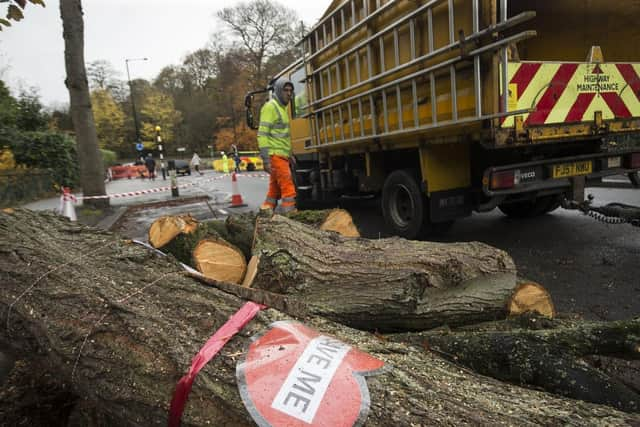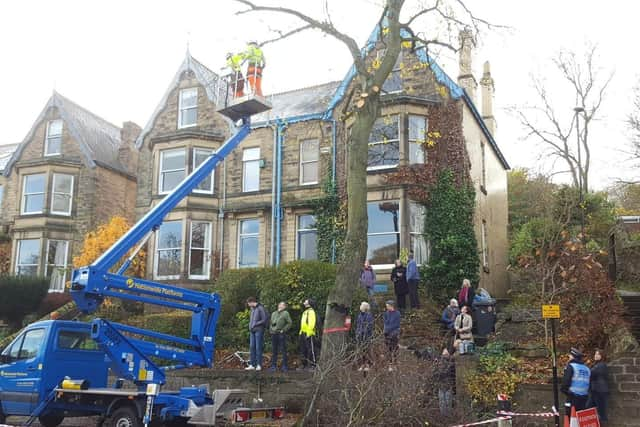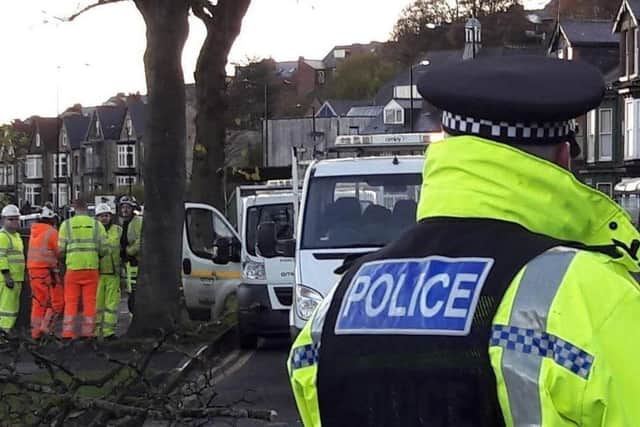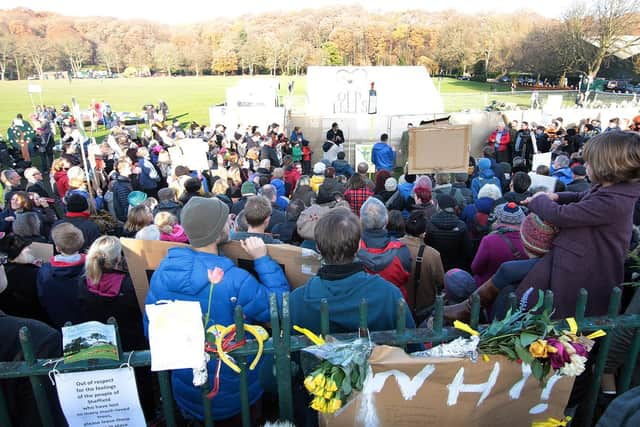Sheffield Council misled public and acted with ‘lack of honesty’ over tree-felling scandal, damning investigation finds
A 25-page report by the Local Government and Social Care Ombudsman has recommended an unreserved public apology is issued by the council to the people of the city within the next three months over its handling of the controversial removal of thousands of street trees.
Sheffield Council today said it fully accepted the findings and that it had got "some things wrong".
Advertisement
Hide AdAdvertisement
Hide AdIt has made the call after upholding a complaint by a now-deceased member of the public about their interactions with the local authority on the matter over several years.


It concluded the council should “provide a public, unreserved apology accepting those findings of this investigation which draw attention to general failings in the implementation of its ‘Streets Ahead’ policy”, as well as providing a private apology to the complainant’s family.
The report added: “We ask it [the council] consider if there are wider implications for how it delivers services and lessons it should learn as a result of how it implemented its Streets Ahead programme. In particular, how it can embed the principles of openness and accountability across all its services.”
The LGO said despite the death of the complainant, it felt it was important to proceed with the investigation because the issues he had raised were of wider public interest.
Advertisement
Hide AdAdvertisement
Hide AdThousands of trees were removed and replaced with saplings under the council’s £2bn, 25-year Streets Ahead highways improvement contract with Amey which started in 2012.


Felling work was paused in spring 2018 as growing protests against the work attracted international condemnation when dozens of police officers and private security guards were sent to support the operations and multiple arrests were made.
The council also made attempts in court - in legal action that was “positively agreed” by leader Julie Dore - to have a number of demonstrators jailed for breaching a protest injunction, with two given suspended jail sentences.
A new strategy has since been introduced following lengthy talks with campaigners and hundreds of previously at-risk trees have now been saved from the axe.
Advertisement
Hide AdAdvertisement
Hide AdPaul Selby, from the Sheffield Trees Action Groups organisation, said the complainant in the case was a man named Alan Robshaw, who died in May this year - five months before the report was published.


Mr Selby said the damning findings “should be required reading for all senior managers in Sheffield Council”.
The Ombudsman’s report largely focuses on one of the most contentious episodes of the saga when the council sent contractors out before dawn to fell eight trees on Rustlings Road in November 2016 accompanied by police officers.
Mr Robshaw complained that the removal had taken place despite specialists and the council’s own Independent Tree Panel recommending only one of the trees needed removing.
Advertisement
Hide AdAdvertisement
Hide AdAmey had conducted a survey of trees to identify those which needed to be removed. The council said removal would be a ‘last resort’ and Amey would consider a list of 14 engineering or other solutions before trees would be cut down.


On the day the trees were removed, the council only published its response to the specialists’ recommendations at 4.30am - a move it said was to prevent a significant protest by residents.
Contractors turned up on site and started work just 30 minutes later. Residents had not been given notice the work was scheduled. The council said this had been done ‘on police advice’ but South Yorkshire Police stated they had no input into the plans.
Three people were subsequently arrested as they attempted to stop the felling going ahead in an incident then-Sheffield Hallam MP Nick Clegg likened at the time to “something you’d expect to see in Putin’s Russia, rather than a Sheffield suburb”.
Advertisement
Hide AdAdvertisement
Hide AdThe situation led to calls for the council leader Julie Dore to resign but she walked out of a council meeting during a motion to discuss that matter the week after the incident.
The council initially intended to fell 11 trees along the road but that was subsequently reduced to eight.
Residents, including the complainant who was a qualified architect with detailed knowledge of highway design, were written to in July 2015, with the letter stating the council could “validate” claims by its contractor that three people had broken bones as a result of injuries connected to the trees. It also said residents of the street had reported “trips and falls”.
But the Ombudsman’s report states: “Later information released by the council established there had been no reported incidents or injuries on the street where he lives in recent years.”
Advertisement
Hide AdAdvertisement
Hide AdThe report also reveals evidence from Mr Robshaw, who is referred to as Mr G in the report, about the trees was not passed on to an Independent Tree Panel established by the council to assess potential removals - despite him being told that would happen.
“Before the ITP undertook any inspections, Mr G wrote to the Council asking for the opportunity to present evidence,” it states.
“He understood from correspondence with a local councillor that a statement he gave would be passed to the ITP. The council has disputed this although Mr G has provided an email from a council officer saying they had passed on information from him to the panel chair.
“However, when the ITP inspected in July 2016 Mr G found it had only been provided with records from the Council.”
Advertisement
Hide AdAdvertisement
Hide AdThe tree panel recommended to the council in July 2016 that six of the eight trees could be saved but the council decided to go ahead with the felling work.
The authority told the Ombudsman it attempted to remove them before the predawn work in November 2016 but was prevented from doing so by protesters. When asked by the Ombudsman to clarify when this was, the council said it was unable to do so as it had not documented the dates of failed attempts.
The report added: “Mr G disputed this description and that the council made any effort to remove trees before November 2016.
“He says the council policy was not to remove trees until it had given its response to the ITP advice. So, had it attempted this, it would have been contrary to that policy. In this case the council did not respond to the ITP advice until the day of the felling, i.e. in November 2016.”
Advertisement
Hide AdAdvertisement
Hide AdThe council published its response to the ITP at 4.30am of the morning of the felling work in November 2016. Contractors arrived on the road 30 minutes later accompanied by the police who knocked on residents’ doors to have vehicles removed that blocked access to the trees.
The report said while the council had initially claimed the timing of the work was on police advice, this was incorrect.
“A press release issued by the council said it had started the work to remove trees at this time “on the advice of the police to make sure it could be done safely”,” it said. However, an email sent by the Council at the time which was later put in the public domain said the police 'had no input into writing the plans or finalising start times and merely provided operational support based on our plan'.
“Information released by South Yorkshire Police under Freedom of Information and published on its website show at least one person reported their car stolen, not realising the council had towed it away. Others complained of having had no notice of the road closure. Mr G also points out that despite the temporary road traffic regulation order giving residents access to and from their houses, some were prevented from leaving during the works.
Advertisement
Hide AdAdvertisement
Hide Ad“We also note the contractor had instructions to remove branches overhanging residents’ gardens first (before 7am) with no consent being sought for this from residents affected. Mr G provided us with footage of tree removals taking place in the dark with contractors working over gardens and branches falling outside designated safety zones.”
The council felled seven of the eight trees scheduled for removal, with a resident preventing the removal of the other by sitting in the garden underneath it.
The tree that was saved still remains standing after the council’s new approach to the issue designed to save more trees resulted in changes to the kerb around it rather than being felled.
The council’s own ‘lessons learned’ review of the wider tree-felling programme published in December 2019 found that “in some cases” where the Council had previously rejected advice from the ITP, this was wrong as its advice “would have been appropriate to follow”.
Advertisement
Hide AdAdvertisement
Hide AdThe LGO upheld Mr G’s complaint, finding fault by the council “causing injustice” in a series of damning conclusions.
The Ombudsman said there was “no evidence” the council had previously sought to remove trees on the roads as claimed before conducting the fellings “in the predawn hours, accompanied by a significant police presence, waking residents and removing cars without warning”
The report also found that failing to properly address reasonable concerns was a key factor in what unfolded.
It said: “We have investigated if poor administrative practice also contributed to the growing opposition faced by the Council which led to Mr G’s complaint and many other expressions of dissatisfaction with its actions.
Advertisement
Hide AdAdvertisement
Hide Ad"We find Mr G clearly wanted to be helpful, informative and constructive in his engagement with the Council. Mr G usefully pointed out to the Council discrepancies between its published statements on tree removals and its practice as well as raising reasonable concerns about how it carried out works.
"We consider many of the faults we identified could have been avoided had the Council engaged with the substance of his concerns at an early stage."
The report said there were “numerous examples” of the council not meeting standards of good administrative practice by failing to act in an open, accountable and transparent manner.
It said: “We consider one of the reasons why the Council’s ‘Streets Ahead’ programme ran into public opposition lies in the lack of information it required from its contractors and officers at the outset, when identifying trees for removal. Also in the lack of information it gave explaining how it had then reviewed those decisions.”
Advertisement
Hide AdAdvertisement
Hide AdIt said the council “chose to draw a veil of secrecy over its consideration of the ITP advice” by not putting details of a review of the costs of proposed engineering solutions or the findings of two arboricultural experts it had consulted into the public domain.
The report then said the council went on to misrepresent expert advice it had received.
"The Council only published the ITP advice and its response on the morning of the day it removed the trees. The statements the Council made in November 2015, when it introduced the ITP procedure, show that it did so to reassure citizens it acted in good faith when carrying out its Streets Ahead strategy. But publishing a document in the middle of the night in the hope of deliberately avoiding scrutiny of its response could only undermine that.
"The Council selected quotes from the further expert advice it received in response to the ITP letter. It consulted two specialist tree consultants to give it a view about the diseased tree. Their advice, in one case detailed and supported by technical surveying, supported the ITP position. They found that while the tree showed signs of disease there was no immediate need to remove it. Yet the Council’s response to the ITP chose not to mention this. Its response suggested instead that the consultant reports justified the opposite conclusion. So, this went beyond a lack of information in the public domain. The Council instead misrepresented the advice it received."
Advertisement
Hide AdAdvertisement
Hide AdThe report added: "The Council cited cost as the reason for not accepting the ITP advice in cases other than the diseased tree. Yet this was not the reason its internal document suggested for rejecting the advice in all cases. Potentially there were also engineering reasons for rejecting the advice.
"The Council publicly said it conducted the removals the way it did based on police advice. That has been subsequently refuted by the documents published by South Yorkshire Police."
The report then said there had been unacceptable “lack of honesty” on occasion from the council about its wider approach to the tree-felling issue.
"What we find unacceptable was the Council’s decision to describe its strategy as requiring Amey to follow the 14 engineering and other solutions listed in the document if a tree was found ‘damaging’ or ‘discriminatory’. These were never part of its contract or those other versions of the tree strategy the contractor had worked to.
Advertisement
Hide AdAdvertisement
Hide Ad"The Council’s December 2019 review acknowledges its contractor would never use some of the ‘solutions’ referred to. But the Council did not explain this in either its public communications or in its correspondence with Mr G. He questioned the Council repeatedly about whether the contractor had to follow the engineering or other solutions as a contractual obligation. He received misleading information from the Council in its replies."
"The published version of the strategy also formed the basis of the instructions given to the ITP. The Council therefore embarked on a process of consultation and independent review that referred to a strategy containing elements that it had never followed and never intended to.
"We find this led to the Council not using engineering solutions to retain trees on Mr G’s road despite the ITP advice to do so and their availability. We note in three cases where the ITP advised retaining a tree the Council did not dispute the availability of an engineering or alternative solution. But rejected it on grounds of cost. Cost was not directly mentioned in the published strategy document as a reason for not carrying out an ‘engineering solution’ to retain a tree."
The findings said there was a “recurring pattern of the Council failing to be open and transparent in decisions taken under its Streets Ahead policy”.
Advertisement
Hide AdAdvertisement
Hide AdIt said: “Transparency goes to the heart of trust in decision making. It is at the heart of good administration. We consider one of the root causes of the significant loss of trust the Council suffered in carrying out its Streets Ahead policy, felt by Mr G and many others, lies in its lack of transparency, openness and on occasion, honesty. "
The findings determined there had been eight further faults from the council, including its “disproportionate response” in undertaking tree removals at 5am; putting up false notices advising of tree removals on the day it was attending Rustlings Road and breaching property owner’s rights under civil law by aiming to remove tree branches overhanging private property before it could be challenged.
It added that the council’s responses to the Ombudsman “did not address the discrepancy between verbal statements made about accidents caused by street trees on Mr G’s road and the information he obtained using Freedom of Information requests”.
The report did note that the council is now working in a “far more open and transparent way” on the issue, having engaged in mediated talks with campaigners that led to a new approach being introduced last year.
Advertisement
Hide AdAdvertisement
Hide AdIt said: “We note that as of July 2019 the Council had felled less than one per cent of trees re-inspected under its new approach. This included the tree on Mr G’s road which its contractors could not fell in November 2016.
“We also consider a more open and transparent approach unlikely to have led the Council to undertake removals in the way it did. As it would not have undermined public trust in its policy to such a point where it faced such opposition that it resorted to such an approach.”
It said that within three months, the council should provide a public and unreserved apology and should also consider the wider implications of the saga for how it delivers services.
Local Government and Social Care Ombudsman, Michael King said: “This case highlights the imperative for councils to act with honesty, openness and transparency – without this people can lose faith in their integrity and not trust they are doing the right thing.
Advertisement
Hide AdAdvertisement
Hide Ad“I welcome the hard work the council has since done to restore people’s faith, and publish more information to increase transparency. Apologising to the people of Sheffield for its past actions and acknowledging what went wrong will help build that trust further.
“I have also recommended the council shares with us how it will take the learning from this case and embed accountability and transparency in both its new trees strategy and its wider services.”
Councillor Mark Jones, Cabinet member for Environment, Street Scene and Climate Change at Sheffield City Council, said: “We fully accept the findings of this report and recognise that our approach to managing the city’s street trees needed to change. We got some things wrong and whilst this report is reflective of a very different and difficult time, we are continuing to make real and significant progress towards a more transparent and collaborative future when it comes to managing our valuable street tree stock.
“Many of the actions outlined in the report are already underway, with the creation of a partnership group and the recent production of a new Street Tree Partnership Working Strategy for Sheffield. Whilst the report recognises this, we know we must do better and we are confident that through our new collaborative approach, we are now in a much more positive and favourable position to ensure our street trees are properly and effectively managed.
Advertisement
Hide AdAdvertisement
Hide Ad“The new working partnership street tree strategy recognises the many benefits trees bring to our urban environment and proposes a more open and inclusive way of working to ensure more transparent processes going forwards. What’s more, we are already in the process of finalising plans to make all historic materials relating to street trees publicly available via an online archive. In doing so, we can allow those who want to look over past documents to do so, but equally, we can all start to look forward as we embark on a new, more constructive chapter.
“Through our new approach, we are committed to retaining trees wherever possible, planting additional trees, increasing canopy cover and building a diverse and resilient street tree stock with varying species and age profiles. We are also committing to engaging with stakeholders and the wider public about our plans for street trees in a more proactive way, to avoid any uncertainty about what we are doing and why. Engagement is key for creating a future-proof strategy that works for us all.
“In this specific case, we will be apologising to the complainant’s family and giving reassurances that we are already on the right path towards a more open and sustainable vision for how we manage street trees, not just for now, but for many years to come.”
Paul Selby, from the Sheffield Trees Action Groups, said: “This report from the Local Government Ombudsman is utterly damning about Sheffield Council's attitude to openness and accountability, and in its failure to uphold the principles of good administrative practice.
Advertisement
Hide AdAdvertisement
Hide Ad“This isn't about mistakes made on a single occasion in trying to resolve a single complaint. This is about utter failure, over a period of four years, to answer a series of reasonable evidence-based questions from one of its own residents. This to the point where the LGO requires an unreserved apology to the resident who made these complaints.
“What makes this shameful episode even sadder is that the resident in question, Alan Robshaw, sadly passed away in May 2020, five months before the LGO issued this report. So, Alan never lived to see or hear his serious, considered and legitimate concerns addressed. Nor did he live to hear the apology that the Council will be forced to make to him, following his efforts over a four-year period to pursue the truth.
“I, and all Sheffield street tree campaigners, recognise that the Council's attitude to street trees has now changed, and we are working collaboratively to implement the newly launched Sheffield Street Tree Strategy. For that I am grateful, and we are working with some genuinely excellent Council Officers who I thoroughly respect, and who are open and honest about the issues they face, and supportive of outside views for how to solve those issues.
“However, I doubt this new positive approach would ever have been achieved had it not been for the determined efforts of Alan and others to unearth the truth about the PFI contract obligations, which prior to recently, was to fell half of all Sheffield's street trees, unnecessarily.
Advertisement
Hide AdAdvertisement
Hide Ad“My fear from my own experience of other more recent campaigns in Sheffield, such as the It's Our City referendum campaign, is that the Council's overall attitude to its residents, outside of the topic of street trees, hasn't really changed.
“It is still failing to be open and accountable. It is still failing to uphold the principles of good administrative practice. Therefore, this LGO report should be required reading for all senior managers in Sheffield Council. As a public servant myself, in central government, had this report been written about me or my team, I would be hanging my head in shame."
Support The Yorkshire Post and become a subscriber today.
Your subscription will help us to continue to bring quality news to the people of Yorkshire. In return, you'll see fewer ads on site, get free access to our app and receive exclusive members-only offers.
So, please - if you can - pay for our work. Just £5 per month is the starting point. If you think that which we are trying to achieve is worth more, you can pay us what you think we are worth. By doing so, you will be investing in something that is becoming increasingly rare. Independent journalism that cares less about right and left and more about right and wrong. Journalism you can trust.
Thank you
James Mitchinson